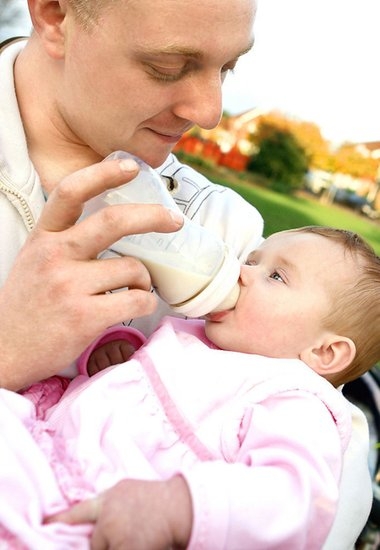(单词翻译:单击)

Women may get a glow during pregnancy, but now it turns out that men feel they are more attractive as well - only after the baby has arrived.
女人在怀孕期间可能会容光焕发,但现在研究发现,男人也会因此而感到自己魅力倍增——不过是在宝宝出生以后。
In the first study of its kind, men said that their self image improved after the birth in what is being called a ‘hidden benefit’ of becoming a dad.
这一研究是首次对这一课题进行探讨,男人表示他们的自我形象在宝宝出生后有所改观,这就是初为人父的“潜在益处”。
The scientists said that men could get the boost because they feel they are more masculine having just seen a mini version of themselves enter the world.
科学家称,男人自我形象改善是因为他们刚目睹自己的微缩版降临世间,这让他们感觉自己男子气概倍增。
They could also get a kick out of women cooing over them as they walk around with their baby.
在男人抱着宝宝外出散步时,那些围着他们柔声交谈的女人们也让他们感到愉快。
Women by contrast did not experience such a lift about their appearance - possibly because the physical demands of raising a child left them a shadow of what they used to be.
相比之下,女人在孩子降生后却没有感觉自己形象有所改善,这可能是因为带小孩对女人的体力要求较高,让她们无暇自顾,所以感觉自己还是老样子。
The study examined 182 people who were all newlywed adults with an average age of 24 for a woman and 26 for a man.
该研究调查了182名新婚成人,其中女性的平均年龄为24岁,男性的平均年龄为26岁。
They asked them to give their verdict on their own wellbeing and appearance at the start of the study, the one year anniversary and the second anniversary.
研究人员让这些人分别在研究开始时、结婚一周年时和结婚两周年时对自己的幸福度和形象做出评价。
One question asked them to rate how attractive they found themselves on a scale of one to 10 and how ordinary they thought they were on a scale of one to five.
其中一个问题是让他们按1到10的等级对自己的魅力指数做出评价,还让他们按1到5的等级评价自己有多普通。
For men who didn’t have children, notions of attractiveness remained stable.
那些没有生育小孩的男人对自身魅力的看法一直保持稳定。
But those who became fathers during the study’s timeframe felt more attractive after their child was born than they did previously.
但那些在研究期间成为新爸爸的人在孩子出生后相比以前感到自己更有魅力。
Lead researcher Alicia Cast, an associate professor the University of California-Santa Barbara, said: ‘I was talking about this paper with my husband and he commented on the attention he got when he was seen in public holding our son after he was born. Like: "Aren’t you a good dad", "Look at that new dad with his baby".
首席研究员、加州大学圣塔芭芭拉分校的副教授艾丽西娅?卡斯特说:“我和我的丈夫谈论这篇论文时,他提到他抱着刚出生的儿子外出时所得到的关注。人们会说:‘真是个好爸爸’,或者说‘看那个抱着宝宝的新爸爸’。
'Women get that feedback, too, because everybody loves a new baby. But that (benefit) may be countered by other things she’s experiencing that he’s not, in terms of how her body has changed and being more physically tired.
“女人也会得到这样的回应,因为大家都喜欢小宝宝。不过这一益处可能被她正经历而男人没有经历的其他事情抵消了,比如身体发生了变化,感觉更疲劳。
‘There’s a lot of attention paid to how women think about themselves – particularly their bodies and their physical attractiveness – after childbirth.
“很多研究关注的是女人在生孩子后如何看待自己——尤其是自己的身体和外表吸引力。
‘But to our knowledge there’s been nothing that looked at men’.
“但据我们所知还没有研究关注男人在孩子出生后对自己的看法。”


